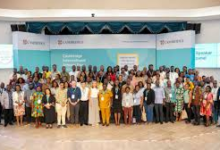World Bank report ranks Ghanaian worker productivity rate 44 per cent

The Ghanaian worker productivity rate has been ranked 44 per cent, by the World Bank report on Human Capital Index (HCI).
The index quantifies the contribution of health and education to the productivity of the next generation of workers.
According to the report, the rating was above the average for the Sub-Saharan Africa, which stands at 40 per cent but below the average for low-middle-income countries, which is 48 per cent.
It attributed Ghana’s poor HCI rating to low test scores in expected years of school, harmonised test scores, survival rate from age five to 60, among other indicators.
Of the 157 countries rated in the index, the average harmonised test score among school children was the second lowest in the world after Niger.
Although Ghanaian children are projected to go to school for 11 and half years on average, the report said their effective years of schooling were only five and half years in terms of what they actually learn.
Ghana’s enrollment rates at Senior High School and tertiary schools were low compared with other countries, while poverty and pregnancy among teenage girls were also identified as major hindrances to school enrollment in the report.
Despite the negatives, the country was found to have made significant progress in various areas of human capital development including higher rating of enrollment in the primary and Junior High School which was higher than the average in Sub-Saharan Africa.
Additionally, stunting rate under age five was also significantly lower than not only the average in Sub-Saharan Africa, but also the average among lower-middle-income countries.
Senior Economist, World Bank, Tomomi Tanaka, presenting the report in Accra on Friday, stated that, Senior High School (SHS) education was crucial in the preparation of Ghanaian youths into the job market as productive and skilled members of the workforce.
This, she said, required an effective implementation of scholarship programmes targeted at poor households as a useful policy intervention to increase enrollments in SHS.
In addition, policy interventions to deal with early marriages and the phenomenon of house helps, which prevent children from completing basic education to progress to the SHS, was also critical to ensure increase in enrollment in senior high schools, she added.
Investment in schools and parental involvement in the education of their children, Madam Tanaka said, would ensure improved learning outcomes in both reading and numeracy scores, and called on the government to examine determinants of learning outcomes to identify the needed programmes for investment.
James Aidoo, a Development Consultant, urged the government to direct oil revenues to the funding of education and health service delivery to address funding gaps in those sectors.
By CLAUDE NYARKO ADAMS





